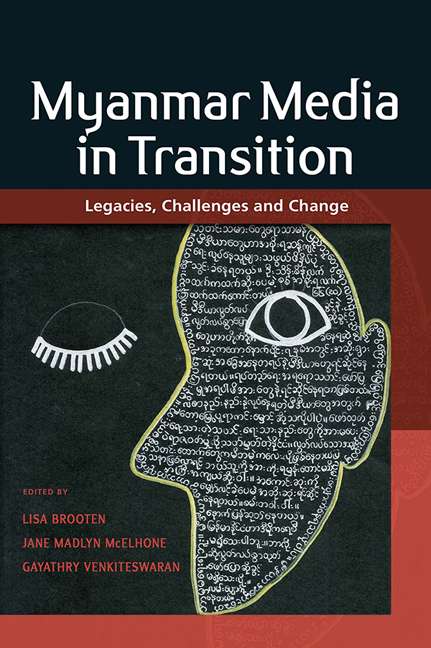Book contents
- Frontmatter
- Contents
- Contributors and Editors
- Burma or Myanmar? A Note on Terminology
- 1 Introduction: Myanmar Media Historically and the Challenges of Transition
- Part I Structural Constraints and Opportunities
- Part II Journalism in Transition
- 6 Silencing a Snakehead Fish: A Case Study in Local Media, Rural-Based Activism, and Defamation Litigation in outhern Myanmar
- 7 Precarity and Risk in Myanmar's Media: A Longitudinal Analysis of Natural Disaster Coverage by The Irrawaddy
- 8 Educating a New Generation of Watchdogs: Interview with Ye Naing Moe, Director of the Yangon and Mandalay Journalism Schools
- 9 The Metamorphosis of Media in Myanmar's Ethnic States
- 10 Covering Rakhine: Journalism, Conflict and Identity
- 11 Media in Myanmar: Laws, Military and the Public
- 12 Cracking The Glass Ceiling in Myanmar Media
- 13 Media and the 2015 General Elections
- Part III Creative Expression
- Part IV Society and Media
- Epilogue: Media Studies in Myanmar – Where Do We Go from Here?
- Index
6 - Silencing a Snakehead Fish: A Case Study in Local Media, Rural-Based Activism, and Defamation Litigation in outhern Myanmar
from Part II - Journalism in Transition
Published online by Cambridge University Press: 07 September 2019
- Frontmatter
- Contents
- Contributors and Editors
- Burma or Myanmar? A Note on Terminology
- 1 Introduction: Myanmar Media Historically and the Challenges of Transition
- Part I Structural Constraints and Opportunities
- Part II Journalism in Transition
- 6 Silencing a Snakehead Fish: A Case Study in Local Media, Rural-Based Activism, and Defamation Litigation in outhern Myanmar
- 7 Precarity and Risk in Myanmar's Media: A Longitudinal Analysis of Natural Disaster Coverage by The Irrawaddy
- 8 Educating a New Generation of Watchdogs: Interview with Ye Naing Moe, Director of the Yangon and Mandalay Journalism Schools
- 9 The Metamorphosis of Media in Myanmar's Ethnic States
- 10 Covering Rakhine: Journalism, Conflict and Identity
- 11 Media in Myanmar: Laws, Military and the Public
- 12 Cracking The Glass Ceiling in Myanmar Media
- 13 Media and the 2015 General Elections
- Part III Creative Expression
- Part IV Society and Media
- Epilogue: Media Studies in Myanmar – Where Do We Go from Here?
- Index
Summary
With the installation of a semi-civilian parliamentary system in 2011, Myanmar cast off its long-standing international “pariah-state” status and created conditions conducive to economic expansion. As the country increasingly gears its economy towards large-scale, landand resource-intensive development, there are serious, negative consequences for the majority rural population, long subject to land confiscations and other abuses under the military state.
At the same time, political liberalizations since 2011 have expanded the space for civil society and media, creating opportunities for forms of public contestation and political engagement that would have been impossible in previous eras. All over Myanmar, smallholder farmers in alliance with urban-based activists, volunteer lawyers’ groups, media workers and others have been mobilizing against land grabs, forced displacements and other threats. High-profile campaigns have emerged to challenge large investment projects. These movements are not without risk: violent crackdowns, threats of violence, and imprisonment of protesters continue in Myanmar, where the state is intertwined with powerful business interests, and authoritarian mentalities and practices persist. Still, the rollback of the most overt forms of state repression — together with new discourses of state accountability, democracy and rule of law — have encouraged diverse actors to test the possibilities for protest and political activity.
My focus in this chapter is on civil society mobilization in Tanintharyi Region in southern Myanmar, and particularly in Kanbauk, a village of about 1,500 households in the Tanintharyi Hills, eighty kilometres north of the regional capital, Dawei. In recent years, Kanbauk villagers have contended with Delco Ltd, a Yangon-based company that runs a tin and tungsten mine in their area in a production-sharing agreement with the government-owned Mining Enterprise No. 2. Villagers have been seeking to assert some influence over company practices, especially regarding the release of wastewater into local streams. Tensions intensified after an accident in September 2015 in which a tailing pond embankment collapsed causing a flash flood that led to the death of a child and the destruction of many villagers’ houses. I discuss the resistance effort that emerged in the village and the company's strategies to suppress and dismiss it. Specifically, I focus on the work of a Kanbauk writer and activist, Aung Lwin, and an evocative essay he wrote, published in May 2016 in Tanintharyi Weekly, a small regional publication.
- Type
- Chapter
- Information
- Myanmar Media in TransitionLegacies, Challenges and Change, pp. 151 - 176Publisher: ISEAS–Yusof Ishak InstitutePrint publication year: 2019

